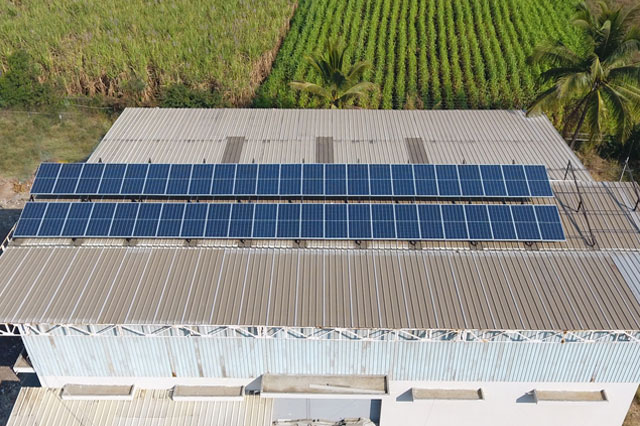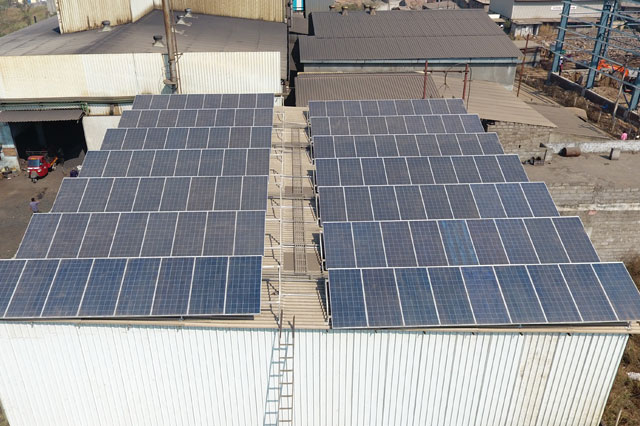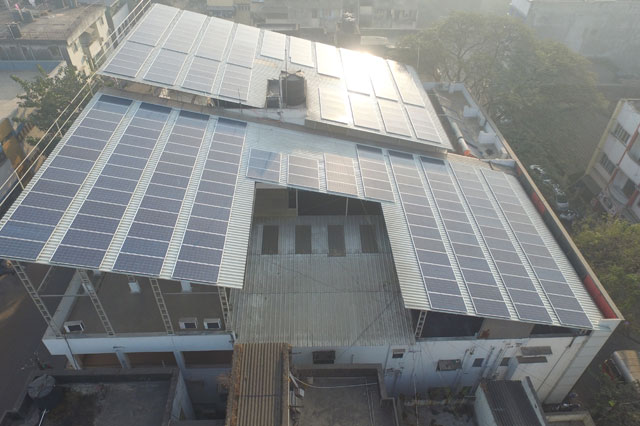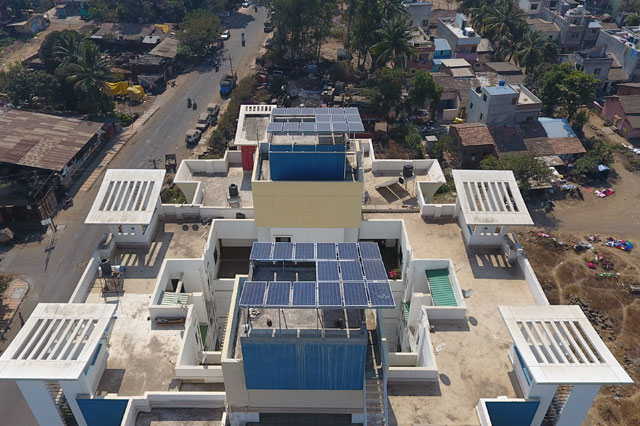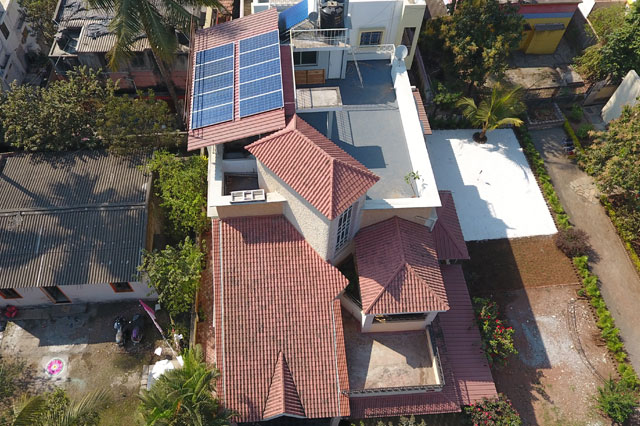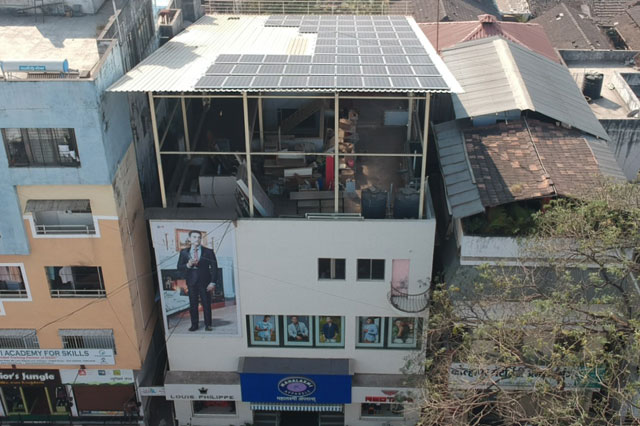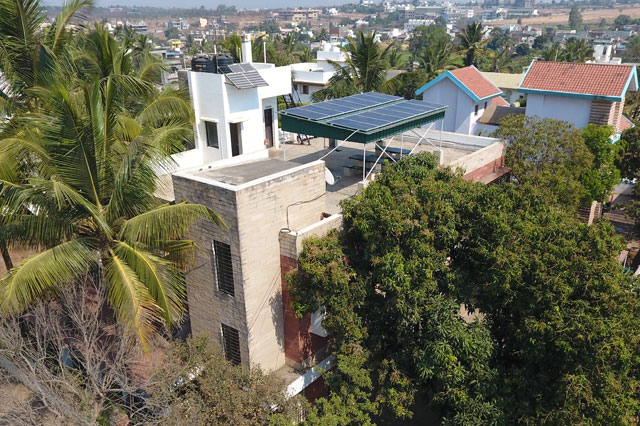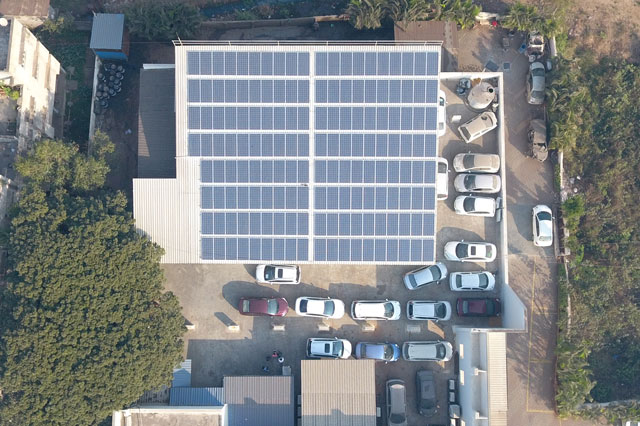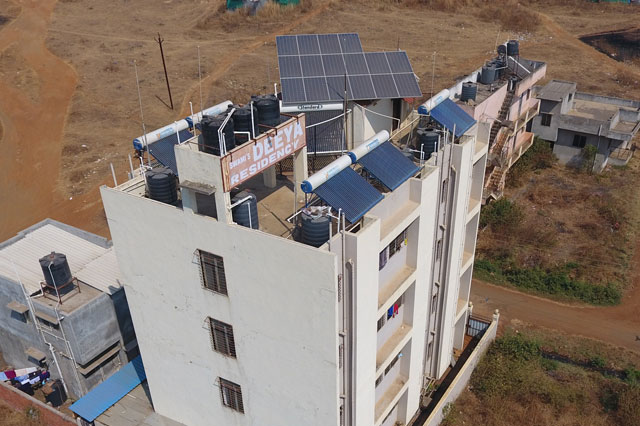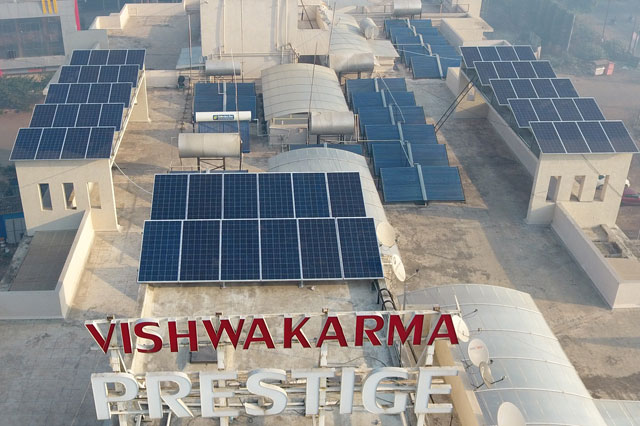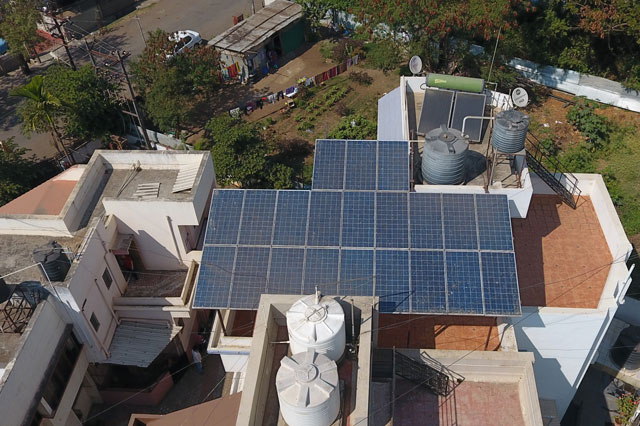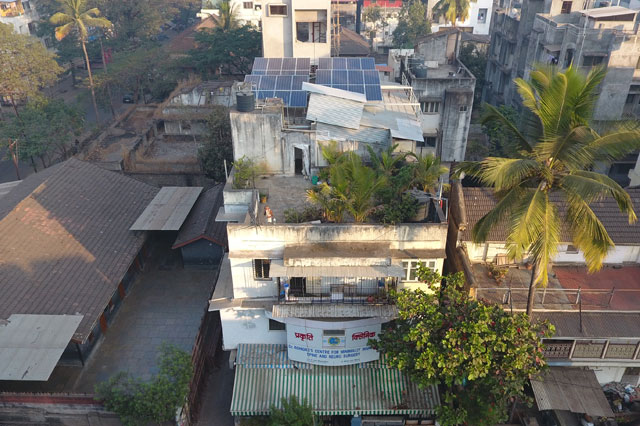Solar Power Generation
Why Solar Energy?
- It’s Free : Sun light contains many energies within such as heat, light etc. Solar power is generated by solar PV panels using light energy of Sun.
- Solar Energy is the most readily available source of Energy In tropical countries like Banglore Sunlight is available at least 320 days a year. Moreover solar PV panels are capable to generate at least 20% energy in dim sunlight like cloudy and rainy days.
- Sun also the most Important & largest of Non-Conventional Resources of Energy Conventionally not much attention was paid to utilize sun energy as fossil fuel availability was more at cheaper price. With time we have understood that the fossil fuel reserve is limited and it is creating damage to environment at every stage. Also Solar energy is the most reliable energy source.
- Highly Efficient System On good solar Intensity day 4-7 kWh per m2 power is produced per day.
- Long term Power Production. Solar power plants has no moving parts or combustion process. The structure is robust ,lasts long. Solar power is long term Energy revenue Generator.
- Eco friendly Power No Green House Gas Emissions. Other power production technics doesn’t even come closer to Solar power production process when it comes environment protection.
Why Solar Roof Top Systems?
Rooftop Solar systems can be installed on the roofs of residential, industrial and commercial complexes, housing societies, educational institutes, community centers, government organizations, private institutions etc. The solar panels can also be installed on ground, terraces and on parking sheds too. No additional FSI is utilized.
Due to solar PV panels array on roof, roof remains cooler and in turn the temperature of the floor below gets reduced by a degree Celsius, thereby reducing the load on the air conditioning equipment and saving electricity.
Further, if solar PV panels are installed on raised fabrication structure (super structure), a spare hall is created on the roof without consuming any FSI.
In many cases the super structure of solar plant, helps resolving water proofing issues too.
The solar power plants are designed depending on annual power consumption of the client; keeping in mind seasonal & weather changes and also the available sunny days. The plant is designed such that the utility bills can be reduced to almost zero (except demand charges and D zone electricity usage in case of TOD: Time of Day meter.)
The payback period for Solar Power Plant is typically 3 to 7 years. (Depending upon utility charges)
The solar Power Generation is Government approved, in fact, more encouraged. The solar power approvals are given by MNRE (Ministry of New and Renewable Energy, Govt. of India).
Being Government encouraged, For commercial complexes and industrial units, there are provisions of (@40%) accelerated depreciation benefit and 10 year tax holiday for income from rooftop power plants.
- No extra FSI consumed, Maximum Utilizations of unused roof
- Lowest Pay-back period (3-7 Years)
- Government of India (MNRE) approved
- Solar panel structure on roof reduces the temperature of the rooms below
- Roof top solar resolves water proofing issues
- Easy finance options from Nationalised banks
- 40 % Depreciation approved by Govt of India Benefit in Saving in Income Tax for Industries and Commercial Sector
- Low interest Loans - Loans from Indian Renewable Energy Development Agency (IREDA) at concessional interest rate
- Priority Sector Lending – Up to 15 Crore for Solar projects and Up to 10 lakhs for individual loans
- No Battery Maintenance
- Five Years Warranty for Grid Inverter & 25 Years for Solar PV modules**
- No permission required from Municipal Corporation free from F.S.I.
- It can be installed quickly.
- It has almost zero noise.
- It requires very little maintenance.
- It’s efficient. The electricity it produces is used where it’s needed: on-site or by the grid; meeting an immediate electricity need.
- No need for costly transmission infrastructure.
- Photovoltaic technology is field proven for more than 20 years in performance and availability.
- Solar irradiation is highly predictable in Banglore.
- Creates a relatively easy way to enter the renewable energy market for a unique power-generating opportunity for a long period of time.
So in nutshell we can say…
Solar Power Generation plants
There two main types of Solar Rooftop systems: On-Grid Solar power system and Off-Grid Solar power system.
-
On-Grid Solar Power Solutions : Also known as Grid Tied Solar PV System
In On-Grid Power Generation, Solar Photo Voltaic (SPV) panel produces DC power, this DC power is converted to AC power in Inverter and is fed to consumer load. When the production / Generation is more than need, excess power is fed to grid through net meter.
Similarly, when demand is more than generation power is taken from grid through net meter. This way net meter keeps record of power fed to grid as well as power consumed from grid.
The solar power plants are designed keeping in mind these seasonal & weather changes also the annual power consumption of the client. Available sunny days data is used to design the plant such that the utility bills can be reduced to almost zero (except demand charges and D zone electricity usage in case of TOD : Time of Day meter.)
The average cost specified by MNRE (Ministry of New and Renewable Energy, Govt. of India) for standard On- grid rooftop solar system is Rs.75 per watt. As the plant size increases the costs gets reduced substantially, even below Rs.50 per watt.
The payback period for Solar Power Plant is typically 3 to 7 years. (Depending upon utility charges)
On-Grid power generation is always preferred as it gives good returns on investment.
Renutron recommends on-grid solar power solution to almost every application. Residential consumer, society common utility consumption, industrial used, hospitals, schools and education institutions, finance institutions, etc.
-
Off-Grid Power Solutions:
In Off-Grid solar power system Solar Photo Voltaic panel converts received sun light into DC voltage. That DC power is regulated and batteries are charged. Inverters are fed with these battery DC power. Inverters convert DC into AC. AC output of inverter serves as power source to the load. While no sun-hours or no utility / electricity hours of the day the stored power in battery is used as power source
Renutron recommends off-grid power solution for users those who do not have easy access to grid electricity e.g. farm houses, resorts etc.
Off-grid solar power systems offer complete autonomy and independence from the national grid and power companies, meaning they never have an electricity bill. Some hybrid off grid system uses utility ( grid), solar and even wind mill with batteries.
Main constraint in the off-grid solar power plant is that it requires large no. of batteries if load and backup time goes up.
Agriculture application Solar Generation plant:
Renutron Promotes the solar power operated pump for agriculture use as in many of the fields, its difficult to provide utility power. This solution gives farmer freedom from haphazard power cut and they can irrigate the fields as per their need. The solar powered agriculture pump saves on water tankers used for cultivation, irrigation, etc. Solar pump is best solution for resorts, farm houses, clubs, etc.to lift the water from distant source to storage tank.
Solar Case Studies Before & After
| Customer Name | Dr Patki Research Foundation |
|---|---|
| Segment Type | Commercial - Hospital |
| Installed Solar Capacity | 80KWp ( 41 + 39 KWp) |
| Year Installed | 2017 |
| Rooftop Area Used | 8000 Sq. Ft. |
| Estimated Solar Generation / Year | 125560 kWh |
| Electricity charges per Unit | Rs. 10.37 |
| Average Monthly Electric Bill Before Solar Lease | Rs. 134565 |
| Average Monthly Electric Bill After Solar Lease | Rs. 27684 |
| Annual Savings In Electricity Bills | Rs. 1302057 |
| Additional Benefits | Depreciation, Terrece Utilization |
| Carbon Dioxide Emissions Mitigation Is | 2460 Tonnes |
| Installation : Equivalent To Planting | 3936 Teak Trees Over The Life Time |
| Customer Name | Rasika Motors / Riverside Honda |
|---|---|
| Segment Type | Commercial - Showroom |
| Installed Solar Capacity | 50KWp |
| Year Installed | 2017 |
| Rooftop Area Used | 5000 Sq. Ft. |
| Estimated Solar Generation / Year | 78475 kWh |
| Electricity charges per Unit | Rs. 17.86 |
| Average Monthly Electric Bill Before Solar Lease | Rs. 220331 |
| Average Monthly Electric Bill After Solar Lease | Rs. 85491 |
| Annual Savings In Electricity Bills | Rs. 1401564 |
| Additional Benefits | Depreciation, Terrece Utilization |
| Carbon Dioxide Emissions Mitigation Is | 1538 Tonnes |
| Installation : Equivalent To Planting | 2460 Teak Trees Over The Life Time |
| Customer Name | Hind Gear Industries |
|---|---|
| Segment Type | Industrial |
| Installed Solar Capacity | 140KWp |
| Year Installed | 2016 |
| Rooftop Area Used | 14000 Sq. Ft. |
| Estimated Solar Generation / Year | 219730 kWh |
| Electricity charges per Unit | Rs. 7.97 |
| Average Monthly Electric Bill Before Solar Lease | |
| Average Monthly Electric Bill After Solar Lease | |
| Annual Savings In Electricity Bills | Rs. 1751248 |
| Additional Benefits | Depreciation, @ 1 °C Temp Decreased |
| Carbon Dioxide Emissions Mitigation Is | 4305 Tonnes |
| Installation : Equivalent To Planting | 2460 Teak Trees Over The Life Time |
| Customer Name | Sri Siddhi / Tanishq Showroom |
|---|---|
| Segment Type | Commercial - Showroom |
| Installed Solar Capacity | 20KWp |
| Year Installed | 2017 |
| Rooftop Area Used | 2000 Sq. Ft. |
| Estimated Solar Generation / Year | 31390 kWh |
| Electricity charges per Unit | Rs. 16.23 |
| Average Monthly Electric Bill Before Solar Lease | Rs. 55715 |
| Average Monthly Electric Bill After Solar Lease | Rs. 13915 |
| Annual Savings In Electricity Bills | Rs. 509460 |
| Additional Benefits | Depreciation, Terrece Utilization |
| Carbon Dioxide Emissions Mitigation Is | 615 Tonnes |
| Installation : Equivalent To Planting | 984 Teak Trees Over The Life Time |
| Customer Name | Vishwakarma Prestige |
|---|---|
| Segment Type | Apartment / Society |
| Installed Solar Capacity | 10KWp |
| Year Installed | 2017 |
| Rooftop Area Used | 1000 Sq. Ft. |
| Estimated Solar Generation / Year | 15693 kWh |
| Electricity charges per Unit | Rs. 13.12 |
| Average Monthly Electric Bill Before Solar Lease | Rs. 20656 |
| Average Monthly Electric Bill After Solar Lease | Rs. 483 |
| Annual Savings In Electricity Bills | Rs. 205892 |
| Additional Benefits | Subsidy, Roof Utilization |
| Carbon Dioxide Emissions Mitigation Is | 308 Tonnes |
| Installation : Equivalent To Planting | 492 Teak Trees Over The Life Time |
Renutron EPC Expertise
Site Survey
Renutron conducts site survey at clients place to confirm the feasibility, site orientations, wind and light directions, cable route, earth pit areas, etc. and transfer the data to design team. Any modification required at site is discussed and confirmed with client.
Sizing and Designing
Renutron is established in power solution business since last 23 years. This expertise gives edge to Renutron in properly sizing the solar system per customer need. Non engineered design of power generation system leads to power wastages, underutilized PV cells, dormant panels, etc. making power plant a nonprofit commodity in fact in some cases a financial liability. Proper designing of the system leads to minimizing all DC losses, AC interference, Maximum utilization of available sun light in all seasons, ensuring all PV panel are shadow free
Procurement
Renutron is leading EPC contractor in solar power systems, we procure the tier-1 material, eliminating any duplication and second quality material. Renutron’ experienced team carries out factory inspections, site inspections and testing of required material. Critical material packing is done under Renutron supervision at OEM factory.
Handling
Renutron experienced team knows how to handle the delicate material and our experty allows to handle pallets by using cranes without any damages, expediting delivery and installations at site.
Installation
Panels have warrantied life of 25 years. Hence all the installations, fabrication, etc. needs to be designed for long term. Renutron has the environmental and meteorological data of India, depending on which we design the tilt angle of max utilization, venerable to cyclones, rigid and rugged fabrication and installation.
Renutron are being expert in power equipment and systems, AC and DC Cabling is done to avoid all drops and interference losses.
Renutron has all expertise, knowledge and tricks to complete earth pits, earthing connections, separate pit for lightening arrester and straight run connection form lightening arrestor to lightening pit.
Liasoning
Renutron understands the significance of government ruling on different permissions, hence we fulfill all the statutory requirements religiously making permission, sanctions and license smooth without hassles to consumers, clients and sanctioning officials.
Monitoring and Maintenance
Renutron has proper setup where we track, record and follow up the power generation in all the plants we have installed. We contact our clients on issues like less power generation, dormant cells, etc. and also provide solution and services to the problems proactively.
Solar Solutions… Why from Renutron?
Established in 1995
Solar plant life is over 25 Years so it’s always advisable to choose an Established Organization having vast experience in Power Electronics field.
MNRE ( Ministry of New & Renewable Energy ) Registered
Central Government Authority has evaluated our Technical competencies, certified and approved us as SITC for Solar Power Plants.
ISO 9001 Certified since 2000
In past 18 years, at RENUTRON, QMS : Quality management System has matured enough to become a way of life. From R&D, MANUFACTURING, SALES, PROJECTS to ON SITE SERVICE SUPPORT, robust standard operating practices are being followed, reviewed periodically and continually improved.
Certified Solar Consultants
As many as 4 of our senior management team members have undergone training and certified by MNRE & MSME.
Manufacturing Experience
Power Conditioning Equipment’s: Over 33000 plus products installations from 1 KVA to 250 KVA also ample Experience in ON-GRID & OFF GRID SYSTEMS from 1 KWp up to 125 KWp Single phase and three phase Solar Power Plants.
Customized and Hybrid Solutions
For On line / Core banking, ATM, DATA Centers, Industrial Loads, Commercial loads, Elevator back-up and other lighting load as per site requirements.
Tier One Products & Optimum Designs
Use of Tier one products and Design expertise ensures the most efficient performance output so that the payback (ROI – Return on Investment) period is minimum.
Prompt On site Services & Strong Back office support
We have a field proven uptime of 98% plus for all our products, for which we have a team of factory trained engineers at 15 locations in 7 states, well equipped with spares and customized software for customer care.
In short RENUTRON is a reliable, technically sound & professionally managed company, which can assure you value for money for your investments in Solar Power on a long term basis.
FAQ - Rooftop Solar Power System
-
What is a Solar Rooftop PV System?
Solar panels are installed on the roof of any residential, commercial, institutional and industrial buildings for electricity power generation. -
Where such Solar Rooftop PV System Plants can be installed?
Such Solar Rooftop PV Systems can be installed on the roofs of residential and commercial complex, housing societies, community centers, government organizations, private institutions etc. The solar panels can also be installed on ground, terraces and on parking sheds too. -
What happens during rainy season or on cloudy days?
The Sun provides two main energies heat and light. Solar PV panel works using light component from the Sun so even if there is no Sun (cloudy atmosphere or rainy days) the generation continues but at a lower rate. Electricity generation does not stop completely. During a typical rainy day it may drop up to @20% or so.
The solar power plants are designed keeping in mind these seasonal & weather changes also the annual power consumption of the client. Available sunny days data is used to design the plant such that the utility bills can be reduced to almost zero (except demand charges and D zone electricity usage in case of TOD : Time of Day meter.)
In a tropical country like India average 320 sunny days are assured.
All solar panels actually works best in cold, sunny conditions. Solar power generation increases in cold temperatures, in fact higher temperatures can reduce the panels efficiency.
In fact, Germany, a country that gets less than half as much sun as the sunniest city in the India, has one of the most successful solar installations in the world.
-
Is Solar Rooftop PV System Costly?
The average cost specified by MNRE (Ministry of New and Renewable Energy, Govt. of India) for standard On- grid rooftop solar system is Rs.75 per watt. As the plant size increases the costs gets reduced substantially, even below Rs.50 per watt.
The payback period for Solar Power Plant is typically 3 to 7 years. (Depending upon utility charges) -
Are Solar Rooftop PV System Plants reliable?
The solar power panel are having performance warranty of min.25 years. The solar inverters are also having 5 years replacement warranty. Solar power plants as old as 25-30 years are functional. -
Is On Grid Solar Rooftop PV System plant a good investment?
Considering that electricity is one of the ever growing basic necessity of modern life, in some industrial / commercial applications it’s as good as raw material. Also that the availability of conventional resources like coal is reducing speedily, the electricity charges are growing steadily. It is definitely one of the best investment. The average pay-back period for solar power plant is hardly 3 to 7 years only, taking into account the 40% accelerated depreciation benefit available. Also there is a 10 year tax holiday benefit on income from rooftop power plants. -
Is there any additional benefit of On Grid Solar Rooftop PV System?
Due to solar PV panels array on roof, roof remains cooler and in turn the temperature of the floor below gets reduced by a degree Celsius, thereby reducing the load on the air conditioning equipment and saving electricity.
Further, if solar PV panels are installed on raised fabrication structure ( super structure ), a spare hall is created on the roof without consuming any FSI.
In many cases the super structure of solar plant, helps resolving water proofing problems too.
The residents are proud of using renewable energy helping and participating in clean and green earth environment movement. -
Do we get Government subsidy or tax benefits on Solar Rooftop System?
Governmental subsidy was available only for residential buildings and government buildings, however, since 23 March 2018, Govt. of India has stopped all subsidies on solar power system, temporarily.
For commercial complexes and industrial units, there are provisions of (@40%) accelerated depreciation benefit and 10 year tax holiday for income from rooftop power plants. -
Does Solar Power System requires Batteries?
In case of On-Grid solar power system, batteries are NOT required. -
What are the different types of Solar Rooftop Systems?
There two main types of Solar Rooftop systems: On-Grid Solar power system and Off-Grid Solar power system.
On-Grid solar power system stores excess generated power on grid while off-Grid solar power system stores excess generated power in batteries. This stored power is used in no sun-hours or no utility / electricity hours of the day. -
How much roof top area is required to set up the Solar rooftop system?
About 10 sq.m. / 100 Sq.Ft. area is required to set up 1 kWp rooftop solar system.
-
What is a Grid Connected Solar Rooftop System?
The DC power is generated from SPV (Solar Photo Voltaic) panel installed on roof top. This DC power is converted to AC power using inverters, for using electrical home appliances and the excess power generated is fed to the grid as long as grid is available. In case, where solar power is not sufficient due to cloud cover etc., the captive loads are served by drawing remaining power from the grid. In case of grid failure (power cut situation) the solar power plant stops the generation on safety grounds. -
What are the advantages of Grid-Connected Rooftop Solar System?
1. Electricity generation at the consumption center and hence Savings in transmission and distribution losses
2. Low gestation period
3. Does Not require additional land; Free from F.S.I.
4. Long term Generation Capacity (25 years min.)
5. Minimum Payback period (3-7 Years)
6. Government approved vendors
-
What is Net metering?
The Net meter is a bi-directional energy recording meter which literally measures the amount of power given to Grid and Taken from Grid, thus keeping an account of net power used from Grid or given to Grid. -
What is Gross metering?
In case of gross metering (in some of the states like Karnataka) entire power generated by the solar is given to grid, it is recorded separately and reimbursed monthly. Whereas consumer continues to pay for power taken from grid as usual. -
How much electricity does a rooftop solar PV system generate?
The amount of electricity generated by a rooftop solar PV plant depends on the location, orientation of the roof, panel efficiency, and ambient temperature. As a rule of thumb, a 1 kWp plant will generate about 4 kWh (units) of electricity a day on average in a year. -
What are the various components of a rooftop solar system?
A rooftop solar PV system primarily comprises of Solar PV Modules (panels), Inverters, and Mounting Structures. -
Do solar power plant work in a mains power cut?
If your solar panel system is connected to the grid, it will shut off in the event of a blackout or power cut. This is to prevent emergency responders and electricity utility repair-people from being injured by your solar panels sending power back to the grid. However, there are certain inverters you can buy that provide backup power in a blackout when paired with a battery or DG set. -
Do Solar panels require a tracking system to follow the angle of the sun?
When panels are installed, they are positioned to maximize sun exposure, meaning tracking systems are not required. Some newer solar panels do integrate tracking systems to change the panel’s positioning throughout the day, but the additional expense may not be worth the limited efficiency gains. -
Do Solar panels require constant maintenance?
Solar arrays are built to be durable and require minimal maintenance. Many installers recommend an annual inspection to check the panels and overall system performance, and many offer warranties for the life of the system. Only maintenance required is to clean panel from dust and bird droppings. -
What are Government body permissions require for Solar Power Plant?
Usually the electrical permits for rooftop solar power plants involve three stages: feasibility analysis, registration and connectivity.
The consumer will have to submit an application to the power distribution company (EB/discom/etc.) along with an application fee. The EB/discom then decides whether to permit the connection for the applied capacity. Based on the recommended capacities from the EB/discom, the customer will register for the solar power plant along with requisite documents and registration charges. This can be usually done by filling out forms at the electricity board or doing them online. This stage will also include the permits required for setting up the Net Metering facility, provided you are eligible for it.
Post the registration process, the connection agreement will be signed between the consumer and the EB/discom. The connection agreement should clearly specify the financial arrangement for excess units exported to the grid in case of net metering and other specifics.
Post the installation of the solar power plant, the EB/discom officials will test and evaluate the standard compliance of the rooftop plant before sanctioning the project.
Renutron is expert in government liasoning Hence consumers have great benefit of hassle free permissions for Rooftop Solar power generation plant.

